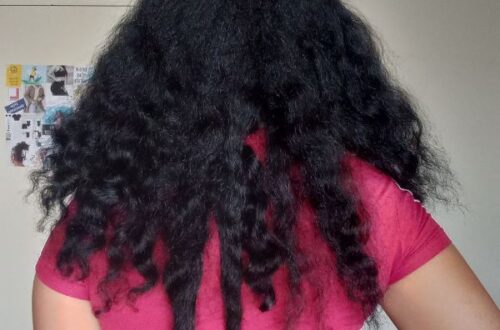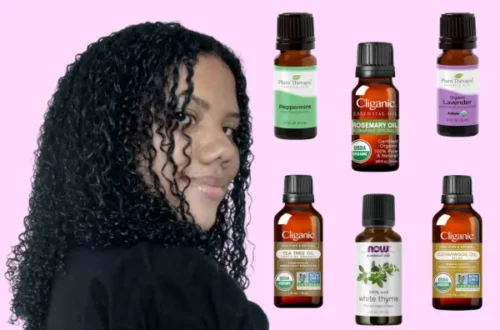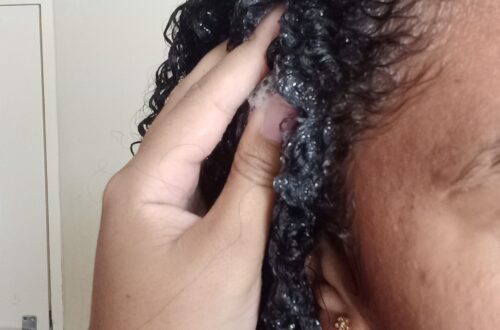Moisturizing Vs Sealing Oils, What’s Best For Natural Hair

The most important thing to consider whenever taking care of your natural hair is moisture. On every wash day, moisturizing should be your main objective, after cleansing of course.
No matter how well you moisturize your hair. If you do not lock in that moisture, you haven’t moisturized your hair at all. That’s where oils come into play.
Whenever you are trying to add hydration and moisturize your hair, you will need to use an oil, this is true whether you have low porosity hair or high porosity hair.
Some people think they use oils to moisturize their hair, but that couldn’t be farther from the truth. Hair oils are sealants, and knowing this can be the difference between juicy curls and dry brittle hair.
- Tips On How To Grow Your Low Porosity Natural Hair Fast
- An Easy Guide For A Natural Hair Wash Day Routine
- Rice Water Rinse Recipe & Routine For Natural Curly Hair
What Is Moisturizing?
Moisturizing your hair means adding water to your hair because water is the ultimate moisturizing agent for any hair regimen.
Other moisturizing products only aim to prevent the loss of water from your hair.
So moisturizing your hair should be done with the right products or process that will slow down water evaporating from the hair shaft.
Oils are your best friend when it comes to sealing moisture into the hair as oils are naturally sealants.
Sealing Oils, or sealants cannot penetrate hair strands rather they coat the hair fiber to form a thin film that seals in moisture that is already present in the hair
Do Oils Moisturize Your Hair?
The simple answer is no.
There is no such thing as a moisturizing oil. As I mentioned, oils seal moisture into your hair shaft and lubricate the hair shaft.
Oils are also good for strengthening the hair, especially herbal oils or oils infused with herbs.
Hair oils influence the strength of the hair to prevent breakage which helps with length retention.
But the ultimate purpose of hair oils is to seal in the moisture you have already added to your hair. Not to add in any moisture of its own.
Oils also have other great properties like they are anti-oxidants, anti-microbial as well as anti-inflammatory to name a few.
So they are very beneficial to your hair care routine.
The Best Sealants For Natural Hair

The best sealing oil helps with preventing moisture loss and moisture retention. As well as strengthens the hair reducing hair breakage and as a bonus gives you shiny hair.
These are excellent sealants to use on your natural hair, for all hair types and hair porosity:
- 11 Top Hair Oils For Type 4 Hair (High & Low Porosity)
- The Best Pre-Poo For Low Porosity Natural Hair
This post contains affiliate links, if you click on any of these links I may earn a commission at no extra cost to you.
Jojoba Oil:
Jojoba oil is the liquid extract from the seeds of the Simmondsia chinensis plant. It is very popular in the haircare community because of its many properties. It is rich in vitamins and nutrients and is a great sealing oil.
Jojoba oils is a lighter oil, impermeable and it sits on the hair shaft, making it perfect for sealing in moisture in both your hair and scalp.
It is best used when your hair is still wet with water and product to really get ultimate hydration.
Chemically Jojoba oil is very close to the structure of natural hair sebum, making it ideal for dry hair and curly hair.
Because it does a good job at locking in moisture jojoba oil is also a great option if you have a lot of frizz after wash days.
How To Use Jojoba Oil:
Use it as a sealing oil: After you have washed your hair, add some leave-in conditioner or the hair cream of your choice and seal in that moisture with some jojoba oil.
Revitalize your flaky scalp: To fight off dandruff or an excess oily scalp, add a few drops of jojoba oil to your scalp, or do a hot oil treatment, leave it on for 30 minutes, and shampoo as usual.
Add it to your conditioner: Add a few drops to your favorite conditioner or hair mask when you’re about to apply it to really vamp up that hydration.
- Castor Vs Jojoba Oil, Which Is Best For Natural Hair Growth
- Do You Need To Oil Your Scalp? How To Harness The Full Power Of Oiling Your Scalp!
- Should You Be Using Eco Gel For Styling Your Natural Hair?
The Best Products With Jojoba Oil:
When using jojoba oil, I love the Cliganic organic jojoba oil, as it is 100% pure jojoba oil and is only $9.99 on Amazon. I also love jojoba oil in my conditioner, and I like to use the Jason conditioner that is infused with jojoba oil.
Sweet Almond Oil:
Almond oil is produced by ripe almonds, commonly sweet almonds.
You can either press the nuts to get unrefined almond oil, or extract it by using heat which would result in refined sweet almond oil.
Unrefined oil, is where the nutrients are most prominent as the chemical process of producing refined sweet almond oil can lower the potency of the oil’s vitamins and nutrients.
Sweet almond oil is packed with great nutrients for the hair, like magnesium which promotes healthy hair growth, and vitamin E, which is great for the scalp.
Because this sealing oil is so rich in fatty acids, it can really restore shine to otherwise dull hair, making it more smooth and silky.
Almond oil can also protect against damage caused by everyday styling, heat and coloring of the hair.
The oil is anti-bacterial so it can really help soothe an itchy scalp and get rid of dandruff.
Lastly, sweet almond oil can also help stimulate hair growth as it contains Vitamin B7 and Biotin which can reactivate dormant hair follicles therefore helping thicken thinning hair.
How To Use Sweet Almond Oil:
DIY hair treatments: To treat severely damaged hair, use a homemade almond oil-olive oil mixture to your hair for a little more luster and shine. Though it cannot revive your hair entirely, it can make the effects less noticeable while still helping to lock moisture into your hair.
Add shine to dull hair: After styling your hair, add a few drops of sweet almond oil to your hair to not only seal in moisture but also add a great shine to your hair.
Get rid of dandruff: Almond oil is anti-inflammatory, making it great for people who suffer from dandruff or psoriasis. If your scalp is irritated or you have dandruff, add some almond oil to it for 30 minutes and then shampoo it off.
Oil your scalp: Almond oil is not just great for the scalp when dandruff is involved, add a few drops to your scalp and treat yourself to a soothing scalp massage
The Best Products With Sweet Almond Oil:
When using sweet almond oil hair masks, Botanica Hearth has one of my favorite hair masks for when my hair is super dry and brittle. If you need pure 100% sweet almond oil, I love this one by NOW solutions.
Extra Virgin Olive Oil:
Olive oil is another great oil for natural hair, it is one of the top emollients because not only is it packed with vitamins, antioxidants, and healthy fats, it also makes for the perfect relief to a dry, itchy scalp.
Extra virgin olive oil also helps fight bacterial infections while strengthening the hair, making it a great ingredient for hair masks, deep conditioners or in a hot oil treatment to lock in hydration and give you some shine.
It is a heavy oil, making it great for treating dry natural hair, because it smooths the hair cuticles and its sealing properties help seal in moisture.
Olive oil is great for dense, thick hair, but the same cannot be said for those with fine hair.
Since fungus thrives in olive oil, it may not be the right oil to use on your scalp or in any products intended for the scalp such as shampoos and scalp masks.
How To Use Extra Virgin Olive Oil:
As a hair treatment: To use this oil as a hair treatment, you can apply it to the ends of your hair, leave it on for 20 to 35 minutes, then rinse it out.
Avocado Oil:
Avocados have been the it girl for a while now, I know we all fell down the avocado toast rabbit hole.
But this fruit has more to it than just being delicious on a bagel.
Packed with vitamins, omega-rich oils, antioxidants, and lipids the oils in avocado can be a game changer for those with brittle hair.
The nutrients in avocado oil seal hair strands, lock in moisture and decrease hair breakage.
Avocado oil also contains bio-active phytochemicals, including vitamin E tocopherols, vitamin D, and carotenoids. Which defends your hair from UV damage, and environmental factors and pollutants that can make your hair feel dry and damaged.
Avocado oil like sweet almond oil also contains biotin, which aids in the growth of healthier, thicker, and longer hair.
The oil is one of the few natural oils that is a penetrating oil. This simply means it does not just coat the hair and sit on top of your hair, but it actually goes into the hair shaft.
Avocado oil can also help stimulate blood flow to the scalp and unclog blocked hair follicles, making it a more conducive environment for hair growth.
How To Use Avocado Oil:
Use it as a sealant oil: Lightly coat your hair with this oil after styling to seal in any moisture and hydration.
Use it for a scalp massage: Add a few drops of avocado oil to your scalp, massage it in, then let it sit for 30 minutes before shampooing.
Add it to your shampoo: Because it is a penetrating oil, I would recommend buying a shampoo with the oil in it, or adding a few drops to your shampoo before you use it to really incorporate the oil into your wash day.
DIY scalp treatment: Because of its fat content and anti-inflammatory nature, avocado oil can nourish dry flaky scalps minimizing the look of dandruff and getting rid of the itchiness.
As sunscreen for your hair: Add a few drops to your hair strands before leaving your house to protect your hair against the elements.
Grape seed Oil:
Grape seed oil is extracted from the seed of grapes, and it has incredible benefits for our hair.
It helps with scalp and hair health by alleviating dandruff and soothing irritation. One of the more lightweight oils, it also works to strengthen the hair shaft and promote a natural shine.
Grape seed oil contains a lower amount of monosaturated lipids and higher amounts of linoleic acid (fats that sit on top of the hair strand).
Because of its composition, this oil works as a great sealant
When applied to the hair, this oil can tame frizz and fight off split ends, but not repair them, nothing can repair split ends.
Due to its high levels of antioxidants, vitamin E, and omegas, grape seed oil can strengthen weak or brittle hair giving it a beautiful luster.
When applied directly to the scalp, the oil can prevent the production of the hormone DHT which causes weakened hair follicles and hair loss.
Due to it being one of the lightest oils, grape seed oil is perfect for those with finer, thinner hair.
How To Use Grape seed Oil:
To defrizz hair: Apply a dime size (laughs in natural hair) amount to your hair while it’s still wet from styling. This will help keep frizz at bay and lock in the moisture.
Scalp treatment: To use it ask for a scalp treatment, apply a generous amount to your scalp, and massage it in, you can do this twice a week. I recommend doing this at the start of your wash-n-go to seal the moisture into your scalp, and at the end of your wash-n-go as a pre-poo treatment.
Jamaican Black Castor Oil:
Jamaican black castor oil is one of the heavier oils, Jamaican black castor oil or all castor oils for that matter are great sealant oils because they can lock moisture into your hair for longer than the other different types of oils.
You can use Jamaican black castor oil in your deep conditioner or simply use it to harness its antibacterial and anti-fungal properties.
Castor oil is another great option for preventing split ends.
Related Post: How To Use Castor Oil For Natural Hair Growth
How To Use Jamaican Black Castor Oil:
Hot oil treatment: Mix equal parts, black castor oil, argan oil, and coconut oil together and use it in a hot oil treatment to give your hair some shine and reap the benefits of the nutrients in this oil.
Overnight scalp treatment: Because castor oil has natural antibacterial and antifungal properties, it can be an effective treatment for dandruff, dry scalp, and other scalp conditions.
Apply a small amount to the roots of your hair and scalp before bed. Spend about 5-10 minutes massaging it into your scalp and cover your head with a shower cap, then your bonnet.
Argan Oil:
Argan oil is derived from the kernels of the argan tree and has plenty of uses to make your hair look healthy, and shiny and add some volume.
Due to its high levels of antioxidants, essential fatty acids, and vitamin E, argan oil helps increase the hair’s elasticity and restore shine to dull hair.
Its antioxidant properties help neutralize hair damage from free radicals all while helping to prevent splitting and breakage.
Argan oil is a heavy oil, so be careful to not weigh down your hair, especially if you have fine hair.
How To Use Argan Oil:
Use it as a conditioner: After cleansing your hair, coat your hair in the argan oil and let it sit on your hair for 10-15 minutes before rinsing it out.
Use the oil as a sealant: Add a few drops to the mids and ends of your hair after styling to seal in the moisture.
Use it as a heat protectant: Natural ingredients like silk protein are important for heat protection, so look for heat-protectant products with argan oil in it to provide a protective barrier while also nourishing and conditioning the hair while giving great slip.
Use as a scalp treatment: Argan oil is rich in antioxidants, making it an effective scalp treatment.
It can reduce inflammation on the scalp that can lead to dandruff, itchiness, and other scalp issues.
Add a few drops to your scalp and massage it in for 5 minutes, then add a shower cap and let the oil sit for 20-30 minutes.
Shea Butter:
While shea butter is more of a fat than an oil, it is still up there when sealant oils are considered.
Since shea butter is filled with vitamins A and E and essential fatty acids, it can reduce the appearance of dry hair and can help prevent split ends while increasing shine and reducing frizz.
Due to its antioxidant properties, shea butter can protect the scalp from sun damage and fight off dandruff. While also reducing inflammation and irritation on the scalp—without clogging pores.
How To Use Shea Butter:
Add to your conditioner or a hair mask: Simply add the shea butter to your conditioning products like, deep conditioner or even your leave-in conditioner. This will smooth hair while eliminating g frizz, tangles and give your hair some shine.
Use it as a hair mask: Shea butter is great as a hair mask or deep conditioner on its own, use a mild shampoo to wash it out, not a co-wash, this will make sure you don’t cause product buildup on your scalp.
Is Coconut Oil Any Good?
As far as DIY hair treatments go, coconut oil is the real MVP.
Coconut oil is very similar to protein treatments when used as a hair mask. It repairs dry and brittle hair, prevents split ends, strengthens the hair follicle, and moisturizes the scalp.
You might be thinking, that sounds great, why isn’t coconut oil on the list? Well as an oil it is great, but as a sealant oil, not so much.
When used as a sealant, or after styling, coconut oil can make the hair feel fry and hard.
The trick with coconut oil is to not use it too often and to thoroughly rinse it out after you’ve applied, not leave it in your hair.
How To Use Sealant Oils On Your Low-Porosity Hair

So you have washed and cleansed your hair, maybe added a deep conditioner and now your hair is ready to get moisturized.
There are 2 common methods used to moisturize hair in the natural community. Namely the LCO method and the LOC method.
The “L” in both of these stands for liquid, this is the hydration you are adding to your hair, which should always be water.
So after washing your hair, make sure that your hair is drenched in water.
The “C” stands for cream or leave-in conditioner, this should be added to your hair to help style and form your curls, while also helping to add more moisture to your hair.
The “O“, stands for, you guessed it, oil. This step is the step that locks all the moisture into your hair, so using one of the best oils for sealing will help you retain that moisture.
I would not recommend the LOC method, as adding the oil before your cream or leave-in forms a barrier for your cream. Making it harder for the cream to penetrate your hair.





